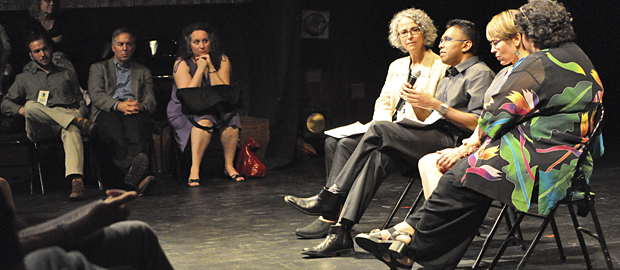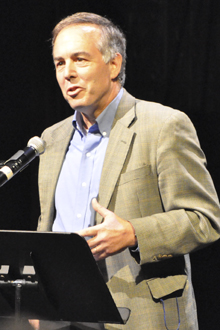Peacebuilding and the Arts premieres a documentary
Film is based in part on Brandeis conference "ActingTogether on the World Stage"

Post-film discussion at La Mama, from left, Roberta Levitow of Theatre Without Borders, Devanand Ramiah of the UN Development Programme, Allison Lund, editor and co-producer of the film and Cindy Cohen, Director of Ethics Center Programs in Peacebuilding and the Arts. Below, Ethics Center Director Dan Terris introduces the film.
 Playwrights, actors, producers, and other theater artists are striving to build peace through performance in areas around the globe that have seen some of the most violent conflicts of recent decades. Yet people working on social justice, post-conflict coexistence, and peacebuilding do not commonly intersect with those in the fields of the arts and culture.
Playwrights, actors, producers, and other theater artists are striving to build peace through performance in areas around the globe that have seen some of the most violent conflicts of recent decades. Yet people working on social justice, post-conflict coexistence, and peacebuilding do not commonly intersect with those in the fields of the arts and culture.
“There is a need for resources, networks, idea sharing, and support for people doing this cutting-edge work,” says Cynthia Cohen, director of the Peacebuilding and the Arts Program of the International Center for Ethics, Justice, and Public Life at Brandeis. “There are people are doing extraordinary theatre work in extremely challenging environments – after the dictatorships and killings in Peru, during the fighting in Yugoslavia in the 1990s, with survivors of the Pol Pot regime in Cambodia. And there are scores of others also dedicated to coexistence, reconciliation, and healing from the perspective of government action and non-governmental aid work."
But despite common goals, Cohen says, "these people typically do not know each other.”
The Acting Together project, initiated through a collaboration between the Ethics Center and Theatre Without Borders, "is designed to strengthen work at the nexus of the arts and peacebuilding,” Cohen says. During the five-year collaboration, theater artists and peacebuilding scholars and practitioners have met, documented work, challenged assumptions, and raised questions about ethics and efficacy.
A new documentary film -- co-created by Cohen and filmmaker Allison Lund, in collaboration with Theatre Without Borders as a part of this project -- documents exemplary peacebuilding performance efforts ranging from reconciliation rituals, to staged works, to community-based participatory theatre. The film also is titled "Acting Together."
On Sept.23, Cohen, Lund, and Theatre Without Borders co-founder Roberta Levitow presented the first public screening of the film before a packed house at the legendary La Mama Experimental Theatre in New York City.
The screening was the kickoff event for a major international conference “Acting Together on the World Stage: Theatre and Peacebuilding in Conflict Zones." The film was enthusiastically received by the audience of international artists at the conference, many of whom came from conflict zones.
Excited about the potential of this film to advance their work, conference participants requested copies to use in university classes in the United States and the United Kingdom, and with artists and peacebuilders in conflict regions including Afghanistan, Colombia, Iran, Iraq, Kenya, Serbia, and Sudan. Initial inquiries were made about using the film to train members of the U.S. Foreign Service.
In "Acting Together," nine theater artists or leaders of ritual from various regions of the world tell stories about the motivations and effects for their work. Their stories are interspersed with clips of rehearsals and performances and with questions and comments from their colleagues reflecting on ethical, aesthetic and practical implications of their work.
“We see people in this movie doing the hard work of living peace and justice,” said Dan Terris, ethics center director and Vice President for Global Affairs at Brandeis, in his introduction to the film at the screening. “The artists depicted here are imaginative and inspirational, and committed to beauty in its many guises. But they’re also shrewd, and hard-headed, and practical in many ways – practitioners who know a lot about creating works of the imagination, but also know a nut from a bolt.”
A response to the film was offered by Devanand Ramiah, a Peace and Development Analyst with the Bureau for Crisis Prevention and Recovery of the United Nations Development Programme, who had just returned from a planning process for strengthening peace and development in the troubled country of East Timor. Watching the film, he said, he realized he should have included theater artists in that planning. Too often, he reflected, theater gets tacked on at the end, as an afterthought.
The film is based in part on interviews with artists and researchers conducted at a 2007 Brandeis conference "Acting Together on the World Stage: Setting the Scene for Peace," in Spanish "Actuando Juntos: Trabajando Por la Paz en el Escenario Mundial," a conference presented by the Slifka Program in Intercommunal Coexistence, Coexistence International, and Theatre Without Borders.
“The film’s subjects inspire me,” says Allison Lund, who edited the documentary and produced it with Cohen. Lund, a filmmaker and editor who has had several films selected for national and international festivals, hopes the film “will bring to light the courageous actions being taken by intellectuals and artists who believe in their work as an affirmation of creativity over destruction.”
The purposes of the film are to highlight exemplary practice; illustrate the contributions of community-based and artist-based theatre as well as ritual and ceremony; illustrate the range of ways that performances can contribute to non-violent resistance, strengthen communities, and nurture reconciliation. It suggests that communities seeking to prevent, stop or recover from violence would benefit from collaborations between artists and cultural organizations.
Those interviewed for the film contributed to a print anthology, also titled "Acting Together," which will be published by New Village Press in two volumes beginning in June 2011.
The Nathan Cummings Foundation in April 2010 awarded $75,000 to the Center’s Programs in Peacebuilding and the Arts to enlarge the project's impact by funding creation of an educational “toolkit” to accompany the Acting Together anthology and film, and to aid the distribution of these resources to educators and practitioners doing related work.
“Support from the Nathan Cummings Foundation will allow us to reach artists and peacebuilders and help them engage creatively with this tension,” said Cohen, “respecting the strengths and the needs of both fields.”
The Acting Together toolkit is intended to make the resources created in the Acting Together project accessible and useful to a variety of constituencies, including artists, peacebuilders, funders, and workers in the fields of development, gender equity, youth empowerment, transitional justice, violence prevention, and related areas.
“In the Acting Together project we have learned that collaborations between artists and peacebuilders can be very effective, yet they are fraught with challenges,” says Cohen. “Artists worry about their work being overly instrumentalized, while peacebuilders and funders generally need specific, documentable outcomes. "
Each element of the Acting Together toolkit – discussion guides, policy briefs, and short video discussion-starters – is crafted to stimulate conversation about an issue or dilemma raised by this work, she said.
Categories: Arts, Humanities and Social Sciences, International Affairs





